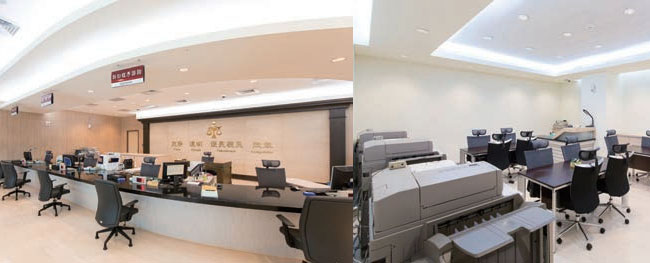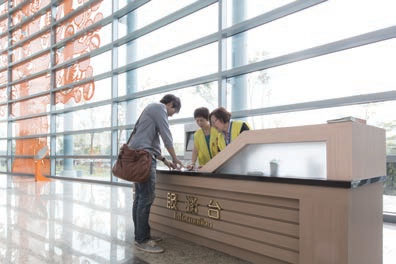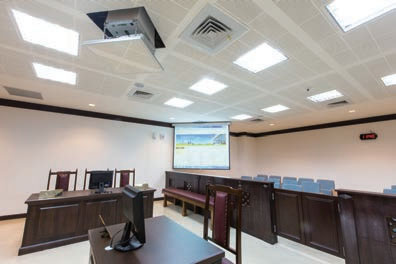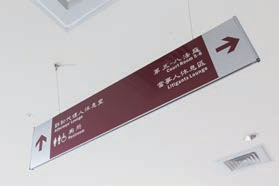
Measures that Provide People Greater Convenience
(1) Joint Service Center and Litigation Counseling
In order to realize the ideals of “justice for the people” and to provide people greater courtesy and convenience, this Court has established a Joint Service Center, combining such functions as receiving briefs from litigating parties, receiving mail, selling blank judicial forms, photocopying, fee collection, and litigation counseling. This Court also recruits volunteers to help at the Joint Service Center, strengthening its capacity to provide better service to the people. The “litigation counseling” includes counseling litigating parties and other related parties with regard to court procedures; helping litigating parties to receive their copies of the court judgment or other court documents; helping litigating parties to write motions with regard to procedural matters; receiving and sending faxes; answering questions regarding the litigation procedure; accessing court database to find the conclusion of the judgment and designated time of court session; helping litigating parties to inspect the court files of the litigated case; helping litigating parties to apply for legal aid of attorney; and providing people the following items for their convenience: examples of how to fill out application forms and other documents, wheelchairs, reading glasses, and stationery. The Joint Service Center is open from 8:30 to 17:30 on weekdays without noon breaks. In addition, the service of receiving briefs from litigating parties is provided by the Bailiffs’ Office from 17:30 to 24:00 on weekdays, and from 8:00 to 24:00 on holidays. Through these services, this Court provides people convenience and helps people protect their rights and interests.
In addition, in order to meet the needs of the disabled, we set up an electronic bell at the front door to call a staff member or a volunteer worker to assist and guide the disabled in the court building. We also reserve some parking space for the disabled people in the second underground floor. The side door is accessible by wheelchair as well.

(2) Internet-Based Measures that Provide People Greater Convenience
As part of the policy of the Judicial Yuan to provide people greater convenience, this Court has accepted the payments of court fees through various payment methods since May 25, 2009. In addition, as technology advances, the use of computers has become more widespread, and documents are increasingly being transmitted through telecommunications, facsimile, or other technological equipment, this Court established, on May 1, 2010, a World Wide Web page to allow court documents to be transmitted through facsimile and electronic communication. This Court has also designated special personnel to handle matters related to electronic communication, seeking to expedite the delivery of court documents. Furthermore, this Court has since July 1, 2011 offered the Online Inquiry System for Trials, through which the litigating parties may, after entering their own email addresses and applying for an account name and password, obtain information regarding the latest development of their cases, court schedules, the results of cases that are made public, judgments, and the real-time information with regard to whether particular judges are on time according to the Court’s schedule.

(3) Court staff who offer service actively
To better meet the needs of the litigating parties and other members of the public and to enhance the quality of services of the Court, in addition to the traditional service center, the Court designates some court staff to actively serve the needs of the people who come to the Court. Except for national holidays, from 9:30 to 11:30 and from 14:30 to 16:30, some staff of the court actively approach and offer service to the people who enter the building. The purpose of this measure is to offer the public a service that is more convenient and of better quality.
(4) Equipment for long-distance inquisition
Pursuant to the policy of the Judicial Yuan, this Court makes use of equipment for long-distance inquisition. Subject to the discretion of the Court in determining the appropriateness in particular cases, the litigating parties, agents, witnesses, and expert witnesses may apply to the Court for permission to use technological equipment that transmits sound and images to make adjudication possible even though litigating parties, agents, witnesses, and expert witnesses are not in court. The Court may also decide to use such technological equipment at its discretion. Long-distance inquisition makes use of information technologies of video conferencing and the Internet to overcome the limits of space in litigation practice. Long-distance inquisition improves the efficiency of court inquisition and is one of the court services that provide convenience to the people.
(5) Technologies at the court
Every courtroom of this Court offers the following equipment for the use of litigating parties, their agents or witnesses:
(A) HDMI/VGA plugs for projector: They are located in the seating area of both litigating parties in the courtrooms. They enable both parties to project the screens of their mobile equipment (such as laptop computers, tablet computers, and mobile phones) onto the courtroom screens. (Both HDMI 19-pin male connectors and VGA 15-pin male connectors are available at the courtrooms. The litigating parties should prepare the connecting cables appropriate for their own equipment.)
(B) Computers for digital display: They enable people in a courtroom to project their computer files (such as video or audio files, PDF files, and Office documents) onto the screens of the courtroom.
(C) Recordings of the court process: Every court process is recorded by digital audio recording system. Litigating parties, their agents, and people who join the litigation, may, after securing the written consent of the people who speak in the court process, pay the required fee and request the court to give them recordings of the court process. The request may be made on the next day after the court process, and must be made within 30 days of the day on which the judgment becomes final. The request must be made out of the necessity to assert or protect the requesting party’s legal interests.
In addition, this Court offers wireless Internet service in the waiting area outside courtrooms as an additional service to the people.

(6) Adding English to All Signs in the Court Building
Acknowledging that the English language is widely used internationally and that foreigners may sometimes also need to participate in administrative litigations, this Court has added English to all signs in the Court Building, including all signs at the Joint Service Center, the front door and hallways, court rooms, as well as in elevators, nursery rooms, and restrooms. This Court has also made the name badges of the staff, directories on each floor, and signs of the wheelchair-accessible equipment bilingual (Chinese and English).

- Release Date:2021-04-28
- Update:2021-06-23
